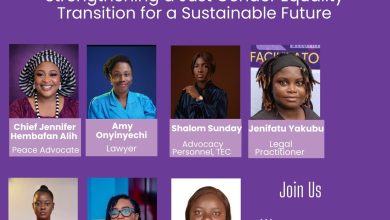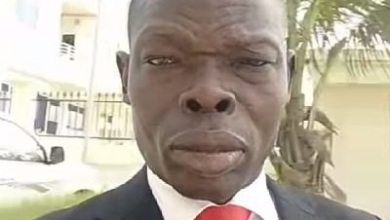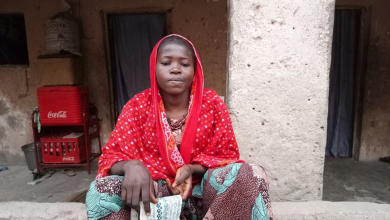
|
Getting your Trinity Audio player ready...
|
People who knew 13-year-old Ochanya Ogbanje had three words to describe her: interesting, outspoken, and very intelligent. Hon. Enuwa Efada Soo, the founder of the rehabilitation centre, Restorer of Paths Care Foundation, who took care of the little girl while she was alive, told Naija Feminists Media (NFM) that she “loves to be in school and was always wanting to know.”
Now a memorabilia of the past, “was” is the tense used to describe that little girl, that no longer “is.”
Who was Ochanya, and why did she die so young?
Ochanya was born in 2005 to Rose Abah-Ogbanje and Michael Ogbanje in Benue State. She was the youngest child of eleven siblings. When the only government school in her community, Ogene Amejo, was shut down, her parents decided that she should live with her aunt, Felicia Ochiga-Ogbuja, to access education. Felicia was a staff member at Benue State Polytechnic, Ugbokolo. She is married to Andrew Ogbuja, who was also an employee at Benue State Polytechnic. The couple has children of opposite sexes, including Winifred and Victor, and they live in Ugbokolo town, Benue.
Following Ochanya’s parents’ decision, she began living with the Ogbuja’s in 2013. She was only eight at the time. Soon after, Victor began raping her. Victor’s sister, Winifred, discovered the sexual assault and reported it to their father, Andrew. Aside from chastising his son for wrongdoing, no legal action was taken against him. Nigeria has a law against rape, with the Violence Against Persons (Prohibition) Act (VAPP Act) of 2015, prescribing a minimum of 12 years imprisonment for first-time offenders. In a cruel turn of events, Andrew joined his son to continue raping Ochanya. It became a dark family secret, with the minor turned into a sexual ploy that binds father and son.
The men continued the heinous act for five years until 2018, when Ochanya fell ill. She had been with her parents at the time and told them that the Ogbuja’s had been raping her. She was subsequently admitted to the Federal Medical Centre in Markurdi, where medical practitioners discovered that she had developed a vesicovaginal fistula (VVF), among other diseases.
According to the Cleaveland Clinic, a Vesicovaginal fistula is a small hole that develops between a person’s bladder and the wall of the vagina. This essentially leads to urine leaking out of the vagina and mostly affects women after childbirth. Regarded as a physical health challenge, it can often lead to emotional distress.
Dr Eli Miracle, a medical practitioner at Motayo Hospital, explained that VVF can occur in a minor during rape due to the lack of maturity in her organ system, and forceful penetration from a rapist.
“The continual force used in the process of rape can affect the vaginal canal, causing it to have an abnormal hole that goes on until it bursts the bladder, which is behind the vagina.” She added, “When this happens, there occurs an abnormal connection in the bladder where urine is stored, leading to a leak of urine from the vagina.”
Ochanya told the media that she spent 2 months and 5 days receiving medical care in the hospital due to the diseases she contracted during her relative’s sexual violation. A few months later, on Oct. 17, 2018, Ochanya died. At the time, she was 13 years old and a JSS 1 student at the Federal Government Girls’ College, Gboko.
Hon Enuwa told NFM that she was heartbroken over Ochanya’s death, and her demise was also very traumatic for the other children who were in her care.
“I was contacted when the family needed rehabilitation and justice for her. I took her to the teaching hospital in Makurdi and Bingham Hospital in Jos.” Hon Enuwa states with multiple tears emojis, on NFM’s community group, “she died in my rehabilitation centre in Otukpo.”
The pendulum of justice swings in opposite directions
Following her death, the National Agency for the Prohibition of Trafficking in Persons (NAPTIP) charged Ochanya’s aunt, Felicia, with negligence in the rape of the deceased teenager in April 2022. By November 2022, the Federal High Court in Markudi convicted Felicia of five years’ imprisonment without the option of a fine. The federal judge of the case, Mobolaji Olajuwon, cited Section 344 of the Criminal Code Act that “the defendant is in breach of that duty of care.” The Court of Appeal in Makurdi upheld the same conviction.
However, when the main perpetrators, Victor and Andrew, were charged in court on October 10, 2019, they were discharged and acquitted by Judge Augustine Ityonyiman of the Makurdi High Court in Benue State.
The judge cited conflicting and insufficient evidence, stating that the police had failed to collect the sperm of the perpetrators and that one of the medical reports had also claimed that Ochanya died of natural causes. Although the victim gave a testimony before her death, and the police officer’s forensic laboratory report revealed that the deceased “suffered diseases that were related to sexual abuse,” the judge said he “could not pick and choose which of the autopsy reports to rely on.”
He, therefore, set the Ogbuja’s free, both the father and son, acquitted and discharged of all criminal charges brought against them.
Reacting to the judgment, legal practitioner Dogo Joy Njeb faulted the prosecutors of the case, stating that they could have sought a court order to get a DNA sample of the defendants and link it to the semen specimen taken from the victim. She added that they should have anticipated losing the case due to conflicting evidence.
“It is the law that where two contradictory evidence are placed before the court by the same party, the judge cannot pick and choose which one to follow but must reject both of them,” the lawyer told NFM.
The Chief Executive Officer of the non-profit organisation, Resilient Girl Initiative, Joy Oluwatoyin Adeboye, who is a rape survivor and fights against gender-based violence (GBV), recommended that the penal code should be adjusted such that when a rape case involves a minor, judges should be able to rely on their experience to determine if the victim is telling the truth.
“The legal framework needs to be reviewed to take minors’ testimonials and medical evidence of penetration as the most important evidence. As long as there is medical proof that penetration has occurred, whoever the child mentions consistently must be punished,” Joy said.
Nigeria’s justice follows social activism
After the acquittal, the case resurfaced on social media in October 2025, leading to an uproar. People protested in markets and signed petitions, celebrities spoke out, women’s rights organisations, such as NFM, released a press statement, and lawmakers requested that the relatives contact them.
Following the uproar, the Ministry of Justice confirmed that Benue State has reopened the case against the perpetrator, citing “new evidence from government prosecutors.”
This was not the first time the justice system would take a U-turn after public outrage. Earlier in the year, on August 5, 2025, popular musician Wasiu Ayinde was involved in a conflict with airport officials in Nigeria. Government officials pleaded on his behalf, and he faced no consequences. Weeks later, a lady, Comfort Emmason, was involved in a conflict with Ibom Air’s official; she was stripped naked, prosecuted, and remanded in Kirikiri maximum security prison in Lagos after the police charged her to court.
When public uproar erupted over the double standards, with NGOs like NFM releasing a statement demanding her release, the legal system took a U-turn. An Ikeja Magistrate’s Court ordered Comfort’s release within 24 hours.
Dogo Joy stated that she found the practice of renewing a case following public backlash in Nigeria to be a new phenomenon, as there is no legal precedent for it. She said that Nigeria prevents citizens from being tried twice, especially in criminal cases where they have been acquitted and the case is subsequently dismissed.
“No person who shows that he has been tried by any court of competent jurisdiction or tribunal for a criminal offence and either convicted or acquitted shall again be tried for that offence or for a criminal offence having the same ingredients as that offence save upon the order of a superior court,” the legal professional cites section 36(9) of the Nigerian constitution.
NFM’s community engagement officer, Oluwafunmi Ogunsola, noted that “social activism is a very important driving factor in getting justice in Nigeria.”
She explained that when Nigerians speak up through tweets, statements, protests, hashtags, and tagging relevant institutions, it typically leads to a change in the government’s actions or institutional stance.
For Ochanya, Hon. Enuwa expressed relief that the deceased minor’s case had been reopened, but hoped justice would take its course this time around.
“I was in court with the perpetrators for three and a half years until we lost the case. I am grateful to God that today, the voices speaking are louder. I pray justice will be given to my Ochanya,” the NGO founder, who is also an evangelist, said.
Chances for justice in rape cases in the country are slim. One report found that Nigeria has only convicted 65 rapists since 1975, despite it being declared a state of emergency alongside other forms of GBV.
To increase conviction rates, legal practitioner Dogo Joy advised that there should be a law reform in Nigeria that reduces the burden of proof on victims, stating that the presumption of innocence for suspects should be balanced with the victims’ rights to justice. She added that there should be a separate division in the police for lawyers to handle rape cases, to prevent improper handling of matters.
The NGO founder, Joy, who had been sexually violated as a minor by a guardian, said that Nigeria must also create harsher rape punishments for perpetrators.
“We don’t need people who rape in our society. Rather than sentencing them to imprisonment, just give them capital punishment, because they might go to prison and start raping other prisoners. A death sentence will deter them,” she said in finality.






